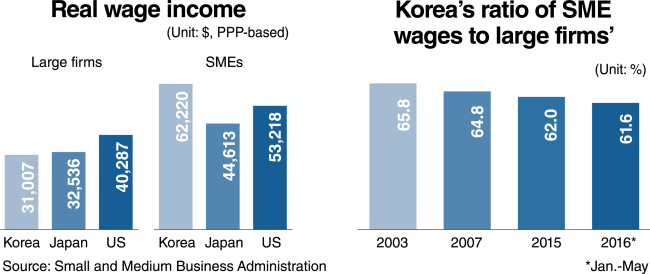Data from the Ministry of Employment and Labor showed this week South Korea’s wage gap between high school and university graduates is smaller than the average of the Organization for Economic Cooperation and Development.
The average wage of the country’s university graduates is 37 percent higher than that of high school graduates. The OECD average wage gap is 56 percent.
This finding seems to betray the general perception in academic background-oriented Korean society that those with college diplomas get paid far more than high school graduates.
Analysts point out that the relatively small wage gap cannot be taken as confirmation that the Korean job market is transforming itself into a competence-oriented one. It is attributable mainly to the seniority-based wage system, from which blue-collar workers benefit more than white-collar employees, as they usually stay longer in the same job.
Experts say the widening gulf between wages of workers at large and small companies should be tackled to reduce the country’s income inequality.
According to data released last week by the Small and Medium Business Administration, the average monthly salary paid by corporations with 300 or more employees in the first five months of this year amounted to about 5.14 million won ($4,589), compared to 3.17 million won for firms with five to 299 workers.
Small and medium-sized enterprises’ average pay fell from 65.8 percent of the average large company salary in 2003 to 64.8 percent in 2007, 62.0 percent in 2015 and 61.6 percent in the January-May period of this year.
A comparison based on purchasing power parity showed that US and Japanese employees at SMEs received 30 percent and 5 percent more than their Korean counterparts, respectively, while big US firms paid workers 14 percent less than large Korean companies and big Japanese firms paid 28 percent less.
Joo Young-sup, the SMBA head, said last week Korea’s imbalanced wage system, which he described as far from global standards, was not sustainable.
This widening wage gap has turned SME employees’ sentiment against habitual strikes by unionized laborers at large companies.
In a survey of 500 SME workers conducted by the Korea Federation of Small and Medium Business (K-Biz) last week, more than 61 percent said walkouts by labor unions at large corporations were mostly inappropriate. They indicated higher wages obtained through labor strikes at major manufacturers would increase burdens on subcontractors in the form of lower delivery prices, further widening the wage gap.
Figures from the K-Biz showed that the average wage at the country’s automakers amounted to 97 million won, compared to 47 million won for their primary suppliers and 28 million won for secondary suppliers.
Workers at Hyundai Motor Co., Korea’s leading carmaker, recently voted down a tentative wage agreement with the management to raise their monthly base pay by 58,000 won in addition to giving 350 percent of the monthly payment and an additional 3.3 million won in performance incentives.
Joo, the SMBA chief, indicated that the current wages received by Hyundai Motor workers were 15 percent higher than those for their counterparts at Volkswagen in Germany and Toyota in Japan.
According to company officials, Hyundai Motor has suffered a production loss of 65,000 units so far this year due to 14 partial walkouts.
The widening wage gap also makes it harder for small and midsize businesses to deal with their chronic manpower shortage.
Reflecting the growing sense of frustration among SMEs, Park Sung-taek, the chairman of K-Biz, recently called for freezing wages for employees of large corporations for five years. His appeal, however, seems to have been rejected by well-paying unionized laborers at major local companies.
The stagnant wages at small and midsize firms, which hire nearly 90 percent of waged workers, are also responsible for a reduction in the proportion of income earned by the middle class.
Analysis of data from the National Tax Service showed the share of earnings for the middle 40 percent in total income fell from 32.5 percent in 2010 to 31.2 percent in 2014.
“It is necessary for the government to implement measures to expand financial support for employees at small and medium-sized companies,” said Kim Se-jong, president of the Korea Small Business Institute.
Experts say the widening wage gap between university and high school graduates suggests the advantages of a college diploma in the job market are gradually disappearing.
They note boosting wages for SME workers will accelerate this trend, helping reduce the proportion of high school graduates entering university, which remains above 70 percent, and settle the severe job mismatch that has distorted the country’s labor market.
By Kim Kyung-ho (
khkim@heraldcorp.com)





![[Exclusive] Hyundai Mobis eyes closer ties with BYD](http://res.heraldm.com/phpwas/restmb_idxmake.php?idx=644&simg=/content/image/2024/11/25/20241125050044_0.jpg)
![[Herald Review] 'Gangnam B-Side' combines social realism with masterful suspense, performance](http://res.heraldm.com/phpwas/restmb_idxmake.php?idx=644&simg=/content/image/2024/11/25/20241125050072_0.jpg)

